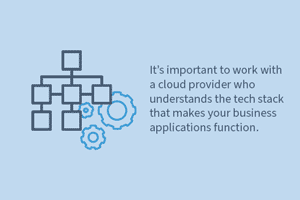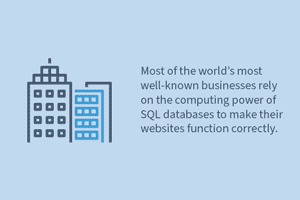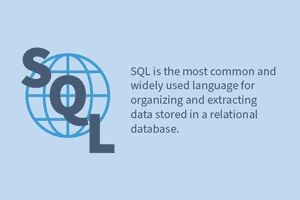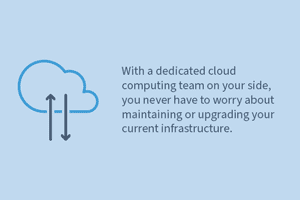
05 Aug What is an SQL Database and Why It Matters to Your Cloud Provider

Since price and scalability are two concerns addressed by transitioning to cloud hosting provider, having a true picture of how your programs operate and the storage requirements you’ll need to keep things optimized should be part of the new client discovery process.
One thing that you may be asked about is your use of SQL databases or if your current applications have an SQL requirement. You may be asked if you have any planned upgrades or major modifications on the horizon.
What is an SQL Database?
SQL stands for Structured Query Language and it’s the most common and widely used language for organizing and extracting data stored in a relational database.
The database consists of tables that store specific, structured data.
From its creation in the 1970’s, SQL has emerged as the workhorse of most backend enterprise applications and most businesses rely on one, if not more, SQL database driven programs to perform essential daily business functions.
Which Business Applications May Use or Require SQL?
If you’re not the tech expert for your organization, you may not be sure which programs and applications use or have SQL requirements.
If your business relies on programs like Microsoft 365, Salesforce, or Microsoft Dynamics you’re using programs that operate off of SQL.

Chances are that any applications you use for accounting, warehouse management, or as a CRM are going to fall into this category.
Because most SQL databases are built to handle very large data sets, it’s important to know how much potential storage and processing capacity you’ll require from a cloud-based data center.
Most of the world’s most well-known businesses rely on the computing power of SQL databases to make their websites function correctly, but SQL is also a very powerful database tool for small businesses.
After all, one of the primary currencies of modern business is data.
Can You Move SQL Databases to the Cloud?
If the primary focus of your business isn’t IT infrastructure, it makes sense to consider moving your databases off site and into a secure cloud environment. By moving your hosting to the cloud, you relieve yourself of the stress and expense associated with maintaining the hardware and software that stores and processes your data.
Many businesses find it easiest to transition to virtual desktops. These machines maintain all the familiarity of the computers you currently use, but with improved functionality and support.
Upgrades on the Horizon?
If you have a planned system upgrade, by moving to a cloud hosted provider, you can reduce the upfront capital expenditures associated with needing additional workstations or server capacity.
With a dedicated cloud computing team on your side, you never have to worry about maintaining or upgrading your current infrastructure. You’ll have access to your data and files whenever you need them, from anywhere in the world, and using any device. The same flexibility applies to your entire staff.
Why We Ask About SQL Databases During the Discovery Process
At CyberlinkASP, we know how important it is to be familiar with our clients’ current database structure, application, and legacy programs so we can have productive conversations about your technology infrastructure, processing needs and future goals.
We want to ask the right questions at every stage of our relationship with you so we can provide optimized performance that meets the business objectives for your company.
Our team of highly trained, industry experts are ready to help you increase your productivity while reducing overall costs. Schedule your call today.

